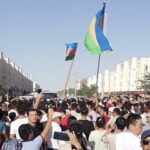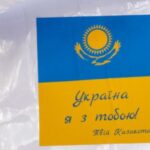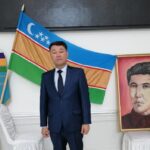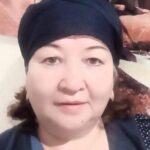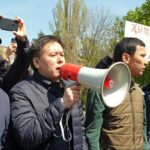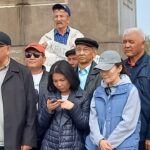2014 OSCE Human Dimension Implementation Meeting, Working sessions 2 and
3, Tuesday 23 September: Fundamental freedoms 1 (on issues of freedom of
association, the role of civil society in the protection of human rights and
freedom of expression)
Written statement by the following
organizations: Kazakhstan International Bureau for Human Rights and
Rule of Law, Nota Bene (Tajikistan), the Turkmen Initiative for Human Rights
(based in exile in Austria), the Human Rights Movement Bir Duino – Kyrgyzstan, the
International Human Rights Association Fiery Hearts Club (Uzbekistan, based in
exile in France) and International Partnership for Human Rights (Belgium).
Current
threats facing human rights NGOs and defenders in Central Asia
Across Central Asia, non-governmental organizations and individuals who
are engaged in human rights promotion and protection activities work in
precarious and insecure conditions. While
the climate for civic engagement remains fundamentally repressive in
Turkmenistan and Uzbekistan, recent developments in Kazakhstan, Kyrgyzstan and
Tajikistan have signalled a deterioration of the situation in these countries.
This trend is related to broader developments in the former Soviet Union,
including recent events in Ukraine that have made leaders in the region
increasingly fearful of challenges to their power. The situation is also
affected by the negative example set by other post-Soviet governments — in
particular the Russian — in their current crackdowns on civil society.
Restrictive legislation impeding the work of human rights NGOs
The adoption and implementation of legislation excessively restricting
the exercise of freedom of association by human rights groups and other NGOs is
a matter of concern in all the Central Asian countries.
Kazakhstan’s new Criminal Code, which was
signed by the president in July 2014 and is due to enter into force in January
2015, contains provisions that further curtail freedom of association in this
country. The Code classifies creating, leading, participating in or financing
unregistered public associations as criminal offences; sets out penalties for
members of public associations for “unlawful interference” in the activities of
state agencies, a term that is not defined; and characterizes “leaders” of public
associations as a separate category of offenders and provides for stiffer
penalties for them for a number of crimes. Human rights activists fear that
these provisions may be used to harass and hamper the activities of
inconvenient NGOs, such as human rights groups and their members. The new Code on
Administrative Offenses, which also was approved in July, retains vaguely
worded provisions under which any violation of national law, no matter how
minor, could result in the suspension or termination of the activities of
public associations. A third new law signed by Kazakhstan’s president this summer, the new Law on Trade Unions, has been criticized for
facilitating de-facto monopolization of the trade union space and undermining
independent trade union activity —
including efforts to defend labour rights — by requiring unions to be part of
industry- and nation-wide structures.
Information from Kazakhstan’s government made public in July[i]
indicates that NGO legislation may be further tightened. In particular, there
are concerns that the establishment of a Ministry of Foreign Affairs working
group to study the experience of other countries with respect to foreign grants
and NGOs may result in the elaboration of repressive draft legislation in this
area similar to that initiated elsewhere in the former Soviet Union, such as in
Russia.
In Kyrgyzstan, NGOs have recently come under increasing pressure and there is
shrinking space for them to operate. Inspired by Russian legislation, members of parliament have proposed
several restrictive draft laws affecting NGOs. One of these prohibits propaganda of so-called non-traditional
sexual relations, thus rendering groups defending the rights of sexual
minorities vulnerable to prosecution. This illiberal draft law was approved by
the relevant parliamentary committees in the summer and is expected to come up in plenary in the second half of October,
which has given rise to fears that it may be adopted in a near future. Another
draft law put forward by three MEPs in May this year requires NGOs to adopt the stigmatizing label of “foreign agents” if
they receive foreign funds and engage in “political” activities. This is a
recycled version of a draft law that was initially proposed last autumn but
pulled back by the authors following civil society campaigning against it and
serious criticism voiced, among others, in an ODIHR/Venice Commission opinion.[ii]
In May 2014, the Ministry of Justice of
Kyrgyzstan also proposed amendments to NGO legislation that, among others,
would abolish the right to establish NGOs without legal status. If these
amendments were to be approved they would put Kyrgyzstan on an equal footing
with its authoritarian neighbouring states where state registration of NGOs is
compulsory.
The Law on Public Associations in force in Tajikistan grants authorities wide
powers to monitor and oversee the activities of associations, resulting in
undue interference in the work of NGOs, including human rights organizations.
In the recent period, there has been an increase in the number of unscheduled
inspections of NGOs, which are often followed by warnings and legal actions
against NGOs for alleged violations of the law. Similarly to in Kazakhstan,
courts may order the closure of NGOs for any violations of national law, and in
a number of cases, NGOs have been liquidated merely for violations of a
technical nature, such as the failure to re-register an organization after a
change of legal address. Among the organizations that have been closed down on
such technical grounds is the Amparo Association of Young Lawyers, an
organization committed to counteracting torture in the army. In June 2014, the
Constitutional Court issued its ruling in response to a complaint filed by this
group. The Court found that the Law on Public Associations overall is
consistent with the Constitution, but stated that the provisions of the law
that concern the closure of NGOs are not sufficiently clear and should be
amended by the parliament.
Already prior to the Constitutional Court decision there
had been reports indicating
that the Tajikistani government (in particular the Ministry of Justice) is
planning to develop new legislation affecting NGOs, including a new Law on
Non-governmental Organizations. In view of trends in NGO legislation elsewhere in the
former Soviet Union, as well as growing mistrust experienced by civil society
representatives in Tajikistan, there are concerns that the elaboration of new
draft legislation in this area may be used to introduce new limitations on NGO
activities rather than to strengthen safeguards against abuse. Local NGOs are
calling on the authorities to consult
with civil society in all efforts to amend legislation on NGOs.
In Turkmenistan,
a new Law on Public Associations entered
into force in May 2014, replacing a law from 2003. This law grants citizens the
right to establish and join local, regional, national and international
associations and allows foreign organisations to establish branches in
Turkmenistan. While some wording has been improved from the previous law, basic
provisions remain problematic. State registration of NGOs is mandatory;
registration rules are prohibitive especially for national-level organizations
(which must have 400 members to gain registration); and authorities are granted
wide powers to monitor and oversee the activities of associations, without
adequate safeguards against abuse. Foreign grants obtained by public
associations must be registered with the government and are subject to
particular scrutiny in view of suspicions of money laundering and terrorism
financing. Under the law, there are also broad grounds on which associations
may be closed down by court.
No new NGO is known to have obtained
registration since the new law entered into force and, as previously, no independent human rights group is registered in this
country, where conditions for civil society activity remain highly prohibitive
and the scene is dominated by state-controlled so-called GONGOs.
The regulatory framework on freedom of
association also remains highly restrictive in Uzbekistan. Under the
country’s legislation, it is compulsory for NGOs to obtain state registration, and the involvement in “illegal” NGO activities is subject
to harsh penalties of up to five years in prison. NGO registration procedures
are cumbersome and grant wide discretion to authorities to deny registration to
inconvenient groups or to drag out the process of considering their
applications indefinitely. As a result, the few independent human rights NGOs that exist in the country, as a rule,
carry out their work without registration, rendering their situation especially
precarious with respect to conducting activities and obtaining funding for
their work. Existing legislation also imposes onerous reporting requirements on
NGOs and makes the receipt of foreign grants by them dependent on the approval
of the “purposefulness” of such funds.[iii]
Similarly to in Turkmenistan, the Uzbek authorities continue to promote a
“state managed” civil sector by supporting the activities of so-called GONGOs.
Pressure on human rights defenders
Those who speak up on human rights in Turkmenistan
and Uzbekistan continue to
face an overhanging risk of persecution, while human rights groups and
defenders in Kazakhstan, Kyrgyzstan and
Tajikistan have increasingly been the targets of negative rhetoric by
public figures, stigmatizing articles in pro-government media accusing them of
serving foreign interests and the like, and other forms of intimidation and
pressure. These trends, which also have affected organizations presenting this
statement and their representatives and partners, have resulted in a heightened
sense of insecurity among human rights defenders in the region.
The human rights movement Bir Duino –
Kyrgyzstan, which often raises sensitive human rights issues, has repeatedly
been subjected to harassment[iv]
— the organization and its director Tolekan
Ismailova has received threats, its office has been broken into, and it has
been prohibited from showing human rights documentary films in some regions of
the country. In the context of the discussion of the draft law prohibiting propaganda
of so-called non-traditional sexual relations in Kyrgyzstan, activists
addressing LGBTI discrimination issues have in particular reported facing
growing harassment. This category of defenders is also at heightened risk in
other countries of the region, as are those defending the rights of other
minorities such as ethnic and religious minorities.
Human rights lawyers working on high-profile cases are another vulnerable
group, as shown by the case against Shukhrat Kudratov and Fahriddin
Zokirov in Tajikistan. Kudratov, who has represented the
interests of, among others, the independent Asia
Plus news agency and opposition figure Zaid Saidov, was arrested on
charges of attempted bribery in late July 2014. Shortly before this, he had sent
an appeal to foreign embassies and international organizations sounding alarm
about harassment of Saidov’s legal team. Zokirov, another lawyer on this team
was arrested on fraud charges in spring. Tajikistani NGOs have called on the
authorities of their country to ensure that the cases of the two lawyers are
investigated in an impartial way and that they are not punished for their
professional activities.[v]
A number of human rights defenders are
currently locked up on grounds deemed to be politically motivated in
Kazakhstan.[vi] Labour
rights activist Roza Tuletaeva is serving a five-year sentence given to her for her
alleged role in the Zhanaozen events following a flawed process. She was denied
parole in August this year. Prisoner rights campaigner Vadim Kuramshin was sentenced to 12 years in prison on extortion
charges in a 2012 trial that did not meet fair trial standards. He has
reportedly faced harassment by prison staff. Lawyer Zinaida Mukhortova was
again forcibly placed in a psychiatric clinic in July 2014 in a protracted
saga that began after she protested the actions of a ruling party member in
2009.[vii]
In Kyrgyzstan, human rights defender Azimjan
Askarov continues to serve a life sentence
handed down to him for his purported role in the June 2010 inter-ethnic
violence following a process marred by fair trial violations and torture
allegations. In February this year, the general prosecutor’s office
discontinued a new investigation into Askarov’s case that was launched in 2013
in light of new evidence in the case. Following an appeal by Askarov’s lawyer,
who represents Bir Duino, a Bishkek district court held in April that this
decision was unfounded and that the investigation should proceed. However, this ruling was subsequently revoked
by the Bishkek City Court on appeal by the general prosecutor’s office, as
upheld by the Supreme Court on 3 September 2014.[viii] Human
rights defenders continue to insist on an impartial and thorough examination of
the case. In view of the injustice
Askarov has suffered in Kyrgyzstan, a complaint in his case has also been
submitted to the UN Human Rights Committee.[ix]
The Uzbekistani authorities continue to
hold numerous human rights defenders in
prison, where conditions are deplorable and torture and ill-treatment
widespread. Those imprisoned on political grounds in this country are
frequently accused of violating prison rules as a means to prevent them from
being released on amnesty, as well as to prolong their sentences when their
initial ones are about to expire.[x]
For example, in March 2014, human rights defender Ganihon
Mamathanov, who was due to be
released after serving out a five-year sentence on trumped-up charges of
bribery and extortion, was given a new two-year sentence for allegedly
disobeying prison authorities in a quick, unfair process.[xi]
There are serious concerns about the health of 63-year old Mamathanov, who has
suffered three heart attacks. Another defender, Abdurasul Khudoinazarov was released on health reasons in late May this year after
being imprisoned for more than eight years, only to pass away the following
month due to cancer and other medical conditions.[xii] He is
believed to have been denied appropriate medical care and to have been subjected
to torture in prison.
In Turkmenistan, little is known about
cases of individuals imprisoned in retaliation for their criticism of
authorities due to government policies suppressing the free circulation of
information and the difficulties of on-the-ground monitoring. A case recently
publicized by Amnesty International served to highlight the plight of such
individuals: Mansur Mingelov, who was
imprisoned in an unfair 2012 trial after exposing police abuse
against an ethnic minority group, began
a hunger strike in mid-May to protest his sentence. He ended it only several
weeks later, when he was in a critical condition, after government officials
reportedly had given attention to his case and the treatment of him.[xiii]
Central Asian human rights activists
living in exile in Europe, such as representatives of the Turkmen Initiative
for Human Rights (TIHR) and the International Human Rights Association Fiery
Hearts Club, have also faced intimidation and harassment, e.g. insulting and
discrediting articles, attacks on the websites and information resources of
their organizations, and retaliatory measures targeting their relatives. In a
recent example of the latter, TIHR Director Farid Tukhbatullin’s brother Ruslan Tukhbatullin was prevented from leaving Turkmenistan in April 2014
and informed that he and his 9-year-old son have been black-listed from
travelling abroad.[xiv] So far
he has not received any explanation for this decision, despite a request to the
Turkmenistan’s Migration Service.
Recommendations
We, the organizations presenting this
intervention, welcome the publication in June this year of the new Guidelines
on the Protection of Human Rights Defenders elaborated by the OSCE Office for
Democratic Institutions and Human Rights (ODIHR). We call on the Central Asian
states, as well as other OSCE participating States to take concrete and
meaningful steps to implement these guidelines, which are based on OSCE commitments and universally
recognized human rights standards that the participating States are bound to
respect.
The Central Asian states should, in particular:
-
Review draft legislation and legislation
in force that affect the right to freedom of association to ensure consistency
with relevant international human rights standards, and amend or repeal any
legal provisions that directly or indirectly criminalize activities protected
by international standards. They should consult with civil society and seek
international assistance, including from the ODIHR in this regard. (Compare
OSCE Guidelines, articles 24 and 64.) -
Ensure that the exercise of freedom of
association in their countries is not contingent on the registration of
organizations; promptly remove any offences related to activity on behalf of
unregistered organizations from their legislation; and ensure that laws and
procedures for NGO registration are clear, simple and non-discriminatory.
(Compare OSCE Guidelines, articles 65, 66 and 67.) -
Refrain from imposing undue, burdensome
and discriminatory requirements on NGOs, including with respect to obtaining
funding, as well as from interfering with their internal affairs, management
and implementation of activities. Any inspection of NGOs should be carried out
in a transparent manner on the basis of an exhaustive list of the possible
grounds for such inspections laid down by law. (Compare OSCE Guidelines,
articles 67, 68 and 73.) -
Give adequate warnings to NGOs that are
found not to have met reasonable and legitimate requirements regarding their
operation to enable them to make corrections, and ensure that any sanctions
against NGOs are proportionate. In accordance with this, the Central Asian
states should ensure that national legislation does not allow for suspending or
closing down NGOs for unsubstantial reasons, such as failure to meet requirements
of a technical nature, and that any decision to impose penalties on NGOs is
subject to judicial review in accordance with fair trial principles. (Compare
OSCE Guidelines, article
69.) -
Ensure that national security concerns
are not exploited to justify measures unduly impeding human rights activities;
refrain from engaging in smear campaigns, negative portrayals or stigmatization
of human rights groups and activists; and publicly acknowledge the importance
of the work of human rights defenders, and condemn discrimination, hostility
and violence targeting them. (Compare OSCE Guidelines, articles 37, 38, 39 and
43.) -
Put an end to intimidation and reprisals
against human rights defenders, including those based in exile and their
families; protect defenders from acts of harassment by non-state actors; and
take steps to prevent abuses against defenders and to investigate and punish
the perpetrators of such acts. (Compare OSCE Guidelines, articles 12 and 13.) -
Ensure that human rights activists and
lawyers are not subject to retaliatory and arbitrary arrest, prosecution or
deprivation of liberty because of their work, including cases they work on and,
in the event that charges are brought against them, that they are granted fair
proceedings and equal access to justice and defence. In accordance with this,
the Central Asian states should promptly review the cases of defenders who have
been locked up following processes falling short of international standards,
including the cases outlined in our intervention, and release all individuals
who are held on grounds of their exercise of freedom of association, freedom of
expression and other fundamental rights. (Compare OSCE Guidelines, articles 23,
30, 36.) -
Guarantee that human rights defenders
deprived of their liberty are treated in accordance with international
standards, without discrimination of any kind, and that allegations of torture
and ill-treatment against defenders – including in the cases mentioned in our
intervention – are promptly, thoroughly and independently investigated and the
perpetrators held accountable and given penalties commensurate with the gravity
of the offence. (Compare OSCE Guidelines, articles 13, 14, 34.)
All OSCE participating States should:
-
Promote awareness of the Guidelines on
Human Rights Defenders; carry out reviews, in consultation with civil society,
of national laws and practices affecting human rights defenders in the light of
the Guidelines; and report to the ODIHR on measures taken to implement the
Guidelines, thereby also setting a good example for other participating States.
(Compare OSCE Guidelines, articles 93, 96 and 104.) -
Establish and implement appropriate
instruments and mechanisms for the support and protection of human rights
defenders in other OSCE participating States; raise instances of human rights
violations against human rights NGOs and defenders with the states concerned
(such as those described in this document), among others at high-level meetings
and international forums; and take action through diplomatic missions to
support human rights defenders in other states, in particular those at imminent
risk of persecution. (Compare OSCE Guidelines, articles 97, 98 and 99.) -
Support the
initiative underway by the ODIHR and the Venice Commission to develop
Guidelines on Freedom of Association and commit themselves to working for the
realization of these guidelines once they have been adopted – both at home and
in other participating States.
The ODIHR,
incoming OSCE Chairmanships and other OSCE institutions should:
-
Continue to
engage in close cooperation with civil society on issues related to freedom of
association and other fundamental rights and maintain the good practice of
holding civil society consultations to this end, such as those held in the
context of the elaboration of the new ODIHR guidelines, as well as the regional civil society consultations organized by the Swiss Chairmanship
this year.
[i] See
http://medialaw.asia/posts/08-07-2014/83196.html
[ii] Available at: http://www.osce.org/odihr/107273
[iii] For more details, see statement of the International
Human Rights Association (IHRA) “Fiery Hearts Club” about the status of civil
society in Uzbekistan, May 2014 (in Russian), at
http://jarayon.com/ru/index.php/2012-04-04-14-31-53/item/781-regionalnyj-seminar-usilenie-roli-grazhdanskogo-obshchestva-v-deyatelnosti-obse-dushanbe-respublika-tadzhikistan-20-21-maya-2014-goda
[iv] For more detailed information, see statement by the
Observatory for the Protection of Human Rights Defenders, 20 January 2014, at
http://www.fidh.org/en/eastern-europe-central-asia/kyrgyzstan/14500-kyrgyzstan-burglary-of-the-offices-of-bir-duino-and-targeted-intimidation
[v] See joint statement of
Tajikistani civil society organizations in connection with the detention
of Lawyer Shuhrat Qudratov, 24 July
2014, available at
http://notorture.tj/en/statements/joint-statement-tajik-civil-society-organizations-connection-detention-lawyer-shuhrat
[vi] A group of representatives of Kazakhstani human rights and
civil society organizations, including Kazakhstan International Bureau for
Human Rights and Rule of Law (KIBHR) Chair of the Board and Expert Consultant
Yevgeniy Zhovtis, have set up an initiative to designate political prisoners in
Kazakhstan, using criteria developed on the basis of those used by Amnesty
International and the Parliamentary Assembly of the Council of Europe. See
lists compiled by the group at: http://www.bureau.kz/data.php?page=0&n_id=5996&l=en; and http://bureau.kz/data.php?n_id=6330&l=ru
[vii] For more background information about these cases,
see briefing paper by International Partnership for Human Rights (IPHR) and
KIBHR, updated March 2014, at http://www.iphronline.org/uploads/9/0/2/7/9027585/kazakhstan_briefing_paper_updated_march_2014.pdf
[viii] For more details see press releases by Bir Duino from
26 August and 4 September 2014 (in Russian), available at
http://civicsolidarity.org/ru/article/1002/v-bishkeke-mogut-peresmotret-delo-askara-azimzhanova
[ix] See press release of Open
Society Justice Initiative, “Azimjan Askarov takes
his torture and unfair trial in Kyrgyzstan to Human Rights Committee,” November
2012, http://www.opensocietyfoundations.org/press-releases/azimjan-askarov-takes-his-torture-and-unfair-trial-kyrgyzstan-human-rights-committee
[x] See more in briefing paper by IPHR and the IHRA
“Fiery Hearts Club”, updated March 2014, at
http://www.iphronline.org/uploads/9/0/2/7/9027585/eng_iphr_and_fiery_hearts_club_updated_hr_overview_march_2014.pdf
[xi] See statement of the IHRA “Fiery Hearts Club”, May
2014 (in Russian), at
http://jarayon.com/ru/index.php/2012-04-04-14-31-53/item/781-regionalnyj-seminar-usilenie-roli-grazhdanskogo-obshchestva-v-deyatelnosti-obse-dushanbe-respublika-tadzhikistan-20-21-maya-2014-goda;
and update by Frontline, May 2014, at
http://www.frontlinedefenders.org/node/26005
[xii] See statement by IHRA “Fiery Hearts Club”, 27 June
2014, at
http://jarayon.com/en/index.php/human-rights/item/261-abdurasul-khudoinazarov-another-victim-of-torture-died-in-uzbekistan-on-the-international-day-in-support-of-victims-of-torture
[xiii] See Amnesty International appeal from 2 May 2014, at
http://www.amnesty.org/en/news/turkmenistan-must-grant-retrial-hunger-strike-prisoner-brink-death-2014-06-02;
and update from 13 June 2014, at
http://www.amnesty.org/en/library/asset/EUR61/004/2014/en/be694288-e72d-4c58-980f-7d7bca81bd46/eur610042014en.html
[xiv] See Human Rights Watch and Amnesty International
statement, 20 May 2014, http://www.hrw.org/news/2014/05/19/turkmenistan-activist-s-family-barred-travel-abroad



